National Film Award for Best Music Direction
| National Film Award for Best Music Direction | |
|---|---|
| National award for contributions to Indian Cinema | |
| Awarded for | Best Music Direction and background score for a feature film of the year |
| Sponsored by | Directorate of Film Festivals |
| Reward(s) |
|
| First awarded | 1967 (Songs) 1994 (Background Score) |
| Last awarded | 2017 |
| Most recent winner | A. R. Rahman (Songs & Background Score) |
| Highlights | |
| Total awarded | 51 (Songs) 10 (Background Score) |
| First winner | K. V. Mahadevan |
The National Film Award for Best Music Direction (the Silver Lotus Award) is an honour presented annually at the National Film Awards by the Directorate of Film Festivals to a musician who has composed the best score for films produced within the Indian film industry.[1] The award was first introduced at the 15th National Film Awards in 1967. At the 42nd National Film Awards, an award for "Best Background Score" was instituted. It was however discontinued after that, and it was not until 2009 that the category was re-introduced. A total of 51 awards—including award for Best Background score—to 40 different composers.
Although the Indian film industry produces films in around 20 languages and dialects,[1] the recipients of the award include those who have worked in seven major languages: Hindi (19 awards), Malayalam (9 awards), Tamil (8 awards), Telugu (7 awards), Bengali (6 awards), Kannada (5 awards) and Marathi (2 awards).
The first recipient of the award was K. V. Mahadevan who was honoured for his composition in the Tamil film Kandan Karunai (1967).[2]A. R. Rahman has been the most frequent winner with six wins,[a] followed by Ilaiyaraja with five awards. Jaidev and Vishal Bhardwaj have won it three times each.[3] Four musicians—B. V. Karanth, K.V. Mahadevan, Satyajit Ray and Johnson have won the award twice each. Ilaiyaraaja is the only composer to have won the award for working in three different languages—Telugu, Tamil and Malayalam—while Rahman won the award for performing in two different languages—Tamil and Hindi—including one for his debut film Roja (1992).[4][b]
Johnson won the inaugural "Best Background Score" award—for Sukrutham—in 1994. When the award was reinstated in 2009, Ilaiyaraaja won it for the Malayalam film Pazhassi Raja.[7] The most recent recipient is A. R. Rahman jointly awarded for Best Score and Background Score for his work in the Tamil film Kaatru Veliyidai and Hindi film Mom, respectively.
Contents
1 Winners
2 Notes
3 References
4 External links
Winners
| Indicates winner for Best Background Score |
| List of award recipients, showing the year (award ceremony), film(s), language(s) and citation | ||||||
|---|---|---|---|---|---|---|
| Year | Image | Recipient(s) | Film(s) | Language | Citation | Refs. |
1967 (15th) | K. V. Mahadevan | Kandan Karunai | Tamil | – | [8] | |
1968 (16th) | – | Kalyanji Anandji | Saraswatichandra | Hindi | – | [9] |
1969 (17th) | – | S. Mohinder | Nanak Nam Jahaz Hai | Punjabi | – | [10] |
1970 (18th) | – | Madan Mohan | Dastak | Hindi | – | [11] |
1971 (19th) | – | Jaidev | Reshma Aur Shera | Hindi | – | [12] |
1972 (20th) | – | Sachin Dev Burman | Zindagi Zindagi | Hindi | – | [13] |
1973 (21st) |  | Satyajit Ray | Ashani Sanket | Bengali | – | [14] |
1974 (22nd) | – | Ananda Shankar | Chorus | Bengali | – | [15] |
1975 (23rd) | 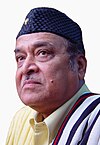 | Bhupen Hazarika | Chameli Memsaab | Assamese | – | [16] |
1976 (24th) | – | B. V. Karanth | Rishya Shringa | Kannada | – | [17] |
1977 (25th) | – | B. V. Karanth | Ghatashraddha | Kannada | For employing the resources of sacred and folk music with unerring skill and sensitivity so as to create an atmosphere of subdued pain and loneliness and to lead the poignant theme to its tragic denouement through the tortured process of its unfolding; for the modulation of effects in terms of sound, covering music in all its variegated range within their span, for heightening the mood in each sequence, almost imperceptibly; for creating art at its concealed best. | [18] |
1978 (26th) | – | Jaidev | Gaman | Hindi | For using the traditional light classical and folk music of U.P. to convey the nostalgia of rural migrants lost in a city. Music in Gaman is an integral part of the film. | [19] |
1979 (27th) | K. V. Mahadevan | Sankarabharanam | Telugu | – | [20] | |
1980 (28th) |  | Satyajit Ray | Hirak Rajar Deshe | Bengali | For brilliant experimentation with different forms and modes of Indian music and for creating a mood of fantasy in a pleasing and harmonious style. | [21] |
1981 (29th) |  | Khayyam | Umrao Jaan | Hindi | For a finely turned score which invokes the spirit of the period and for a felicitous use of music to enrich the central character of the film. | [22] |
1982 (30th) | – | Ramesh Naidu | Meghasandesam | Telugu | For his use of classical music to enhance the aesthetic quality of the film. | [23] |
1983 (31st) |  | Ilaiyaraaja | Saagara Sangamam | Telugu | For his lively, rich and vigorous recreation of traditional music composition and inventive musical ideas adapted to the visual demands of drama. | [24] |
1984 (32nd) | – | Jaidev | Ankahee | Hindi | – | [25] |
1985 (33rd) |  | Ilaiyaraaja | Sindhu Bhairavi | Tamil | For innovative bleding of folk and classical music which lends strength and power to the story. | [26] |
1986 (34th) | 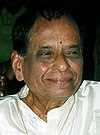 | M. Balamuralikrishna | Madhvacharya | Kannada | For the effective use of classical music blended with folk music. | [27] |
1987 (35th) | – | Vanraj Bhatia | Tamas | Hindi | For creating a thematic score on a heroic scale through melody and complex harmonic arrangements of a symphonic character to stress the human anguish during the holocaust that followed partition, helping greatly in defining the tragic dimensions of the events. | [28] |
1988 (36th) |  | Ilaiyaraaja | Rudra Veena | Telugu | For creating an innovative score which brings out the splendour of classical tradition and blends it beautifully with modern sensitibilities. | [29] |
1989 (37th) | – | Sher Choudhury | Wosobipo | Karbi | For depicting life in interior Assam with a unique background score. | [30] |
1990 (38th) |  | Hridaynath Mangeshkar | Lekin... | Hindi | For using traditional tunes and instruments creatively, with litting melody and haunting perfection. | [31] |
1991 (39th) | – | Rajat Dholakia | Dharavi | Hindi | For using music as an integral part of the film structure, furthering the meaning and dimensions of the theme. | [32] |
1992 (40th) |  | A. R. Rahman | Roja[b] | Tamil | For the harmonious blend of western and Carnatic classical music in Roja, the separate music systems complementing each other without losing their own identities. | [33] |
1993 (41st) | 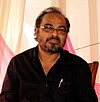 | Johnson | Ponthan Mada | Malayalam | For his music, which exhibits imagination, competence and presentation of the changing contours of music from traditional to modern styles. | [34] |
1994 (42nd) | – | Ravi (As Bombay Ravi) | • Sukrutham • Parinayam | Malayalam | For his melodious rendering of his tunes. The music in both the films exhibit originality and creatively highlights the entire mood of the two films, achieving musical harmony. | [35] |
 | Johnson | Sukrutham | Malayalam | For scoring the background music. | ||
1995 (43rd) |  | Hamsalekha | Sangeetha Sagara Ganayogi Panchakshara Gavai | Kannada | For his authentic utilisation of classical Indian music in both the Hindustani and Karnatic style and presenting a wholesome musical structure to the film. | [36] |
1996 (44th) |  | A. R. Rahman | Minsara Kanavu | Tamil | For innovative compositions breaking all traditions, entering into new era. | [37] |
1997 (45th) |  | M. M. Keeravani | Annamayya | Telugu | For the film's rich, classical music scores and its devotional fervor. | [38] |
1998 (46th) | 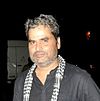 | Vishal Bhardwaj | Godmother | Hindi | For the Hindi film Godmother where the narrative of the film and the music bring about an excellent blend of folk and modern music. It retains the fragrance of the soil of Gujarat. | [39] |
1999 (47th) |  | Ismail Darbar | Hum Dil De Chuke Sanam | Hindi | For an innovative score that blends in the entire spectrum of Indian music form Classical to folk to embellish the musical narrative. | [40] |
2000 (48th) | 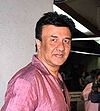 | Anu Malik | Refugee | Hindi | For a score that blends with the story and heightens it's narrative. A great effort has been made to ensure that the compositions have all the ingredients of the music of the soul. | [41] |
2001 (49th) |  | A. R. Rahman | Lagaan | Hindi | For a music score, that is both regional in character and popular in appeal bringing out the ethos of Saurashtra region. | [42] |
2002 (50th) |  | A. R. Rahman | Kannathil Muthamittal | Tamil | For his original musical score highlighting the cultural conflicts and personal anguish in the story. | [43] |
2003 (51st) |  | Shankar–Ehsaan–Loy | Kal Ho Naa Ho | Hindi | For its wide range of styles and modes, enriching the themes of the film. | [44] |
2004 (52nd) |  | Vidyasagar | Swarabhishekam | Telugu | For the songs that are composed as per the situation and enrich the theme of the film. From the beginning to the end he has maintained traditional classical music and used Indian acoustic instruments thus bringing out the colour and flavour of Indian music. | [45] |
2005 (53rd) | – | Lalgudi Jayaraman | Sringaram | Tamil | For bringing alive an era of great musical and dance tradition through the deft use of Indian musical instruments. | [46] |
2006 (54th) |  | Ashok Patki | Antarnad | Konkani | For a judicious range of music from the classical to pop, elevating the film. | [47] |
2007 (55th) | – | Ouseppachan | Ore Kadal | Malayalam | For achieving through music the poignancy of the turmoil of unconventional love. | [48] |
2008 (56th) |  | Ajay-Atul | Jogwa | Marathi | For its well-researched use of traditional and folk music to reinforce the theme of the film. | [49] |
2009 (57th) |  | Amit Trivedi | Dev.D | Hindi | For the innovative composition that blend contemporary and folk sounds. | [50] |
 | Ilaiyaraaja | Pazhassi Raja | Malayalam | For creating epic grandeur by fusing symphonic orchestration with traditional Indian instrumentation. | ||
2010 (58th) |  | Vishal Bhardwaj | Ishqiya | Hindi | For blending rustic flavour with the Indian classical tradition. | [51] |
| – | Isaac Thomas Kottukapally | Adaminte Makan Abu | Malayalam | For minimalistic use of appropriate background score to nurture the essence of the narrative. | ||
2011 (59th) | – | Neel Dutt | Ranjana Ami Ar Ashbona | Bengali | For displaying a variety of contemporary musical forms that rock the city of Kolkata today. He virtually drives the narrative flow composing a variety of songs to portray the world of an ageing rock music performer who suffers from a deep feeling of inadequacy. The songs deal with the emotional and social challenges that beset the film's protagonists. | [52] |
| – | Mayookh Bhaumik | Laptop | Bengali | For his original style in narrating the flow of events centred around a laptop. He brings in a new dimension with his unconventional musical renderings, using both live and electronic instruments to counterpoint the urban tragedies that accompany this peripatetic laptop. The music brings in a narrative element that resonates with contemporary problems in Kolkata, a city weighed down by its own contradictions. | ||
2012 (60th) | – | Shailendra Barve | Samhita | Marathi | Versatile and soulful presentation of songs based on Raagas, backed by Indian instrumentation arranged in a manner that enhances the film. | [53] |
| – | Bijibal | Kaliyachan | Malayalam | Fusion of native ensemble and percussions in a period setting is a challenge well-met by the background score. | ||
2013 (61st) | – | Kabir Suman | Jaatishwar | Bengali | The music director has presented a rich variety of musical genres of Bengal with appropriate voices, instruments and orchestration.. | [54] |
 | Shantanu Moitra | Naa Bangaaru Talli | Telugu | The music composer has kept a balance of music programming and regional acoustic instruments like Saraswati Veena, Mridangam, Ghatam, Morsing and voices to underline the theme of the film. | ||
2014 (62nd) |  | Vishal Bhardwaj | Haider | Hindi | For developing the conflict of the inner and outer landscape through haunting music. | [55] |
 | Gopi Sundar | 1983 | Malayalam | For maintaining the tempo of the film with an in-sync background score. | ||
2015 (63rd) | 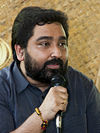 | M. Jayachandran | Ennu Ninte Moideen | Malayalam | Creating a haunting melodic composition, that resonates the tragic love story | [56] |
 | Ilaiyaraaja | Tharai Thappattai | Tamil | For effectively using folk musical instruments and melodies, to give a harmonic layer of meaning to the world of the characters. | ||
2016 (64th) |  | Bapu Padmanabha | Allama | Kannada | For adding soul to the film through Carnatic ragas. | [57] |
2017 (65th) |  | A. R. Rahman | Kaatru Veliyidai | Tamil | – | |
A. R. Rahman | Mom | Hindi | – | |||
Notes
^ Includes one for background scoring.
^ ab The jury of the 40th National Film Awards were tied between Rahman and Ilaiyaraaja—for Thevar Magan—before Balu Mahendra, the chairman voted in favour of Rahman.[5][6]
References
^ ab "About National Film Awards". Directorate of Film Festivals. Retrieved 15 April 2015..mw-parser-output cite.citationfont-style:inherit.mw-parser-output qquotes:"""""""'""'".mw-parser-output code.cs1-codecolor:inherit;background:inherit;border:inherit;padding:inherit.mw-parser-output .cs1-lock-free abackground:url("//upload.wikimedia.org/wikipedia/commons/thumb/6/65/Lock-green.svg/9px-Lock-green.svg.png")no-repeat;background-position:right .1em center.mw-parser-output .cs1-lock-limited a,.mw-parser-output .cs1-lock-registration abackground:url("//upload.wikimedia.org/wikipedia/commons/thumb/d/d6/Lock-gray-alt-2.svg/9px-Lock-gray-alt-2.svg.png")no-repeat;background-position:right .1em center.mw-parser-output .cs1-lock-subscription abackground:url("//upload.wikimedia.org/wikipedia/commons/thumb/a/aa/Lock-red-alt-2.svg/9px-Lock-red-alt-2.svg.png")no-repeat;background-position:right .1em center.mw-parser-output .cs1-subscription,.mw-parser-output .cs1-registrationcolor:#555.mw-parser-output .cs1-subscription span,.mw-parser-output .cs1-registration spanborder-bottom:1px dotted;cursor:help.mw-parser-output .cs1-hidden-errordisplay:none;font-size:100%.mw-parser-output .cs1-visible-errorfont-size:100%.mw-parser-output .cs1-subscription,.mw-parser-output .cs1-registration,.mw-parser-output .cs1-formatfont-size:95%.mw-parser-output .cs1-kern-left,.mw-parser-output .cs1-kern-wl-leftpadding-left:0.2em.mw-parser-output .cs1-kern-right,.mw-parser-output .cs1-kern-wl-rightpadding-right:0.2em
^ Narayanan, Arjun (13 December 2009). "Much more than the name of a raga". The New Indian Express. Retrieved 29 April 2014.
^ Parvez, Amjad (21 December 2010). "Jaidev and his unforgettable music". Daily Times (Pakistan). Archived from the original on 29 April 2014. Retrieved 29 April 2014.
^ Nagarajan, Saraswathy (16 June 2006). "Of rhythm and soul". The Hindu. Retrieved 29 April 2014.
^ Mathai, Kamini (2009). A.R. Rahman: The Musical Storm. Penguin Books India. pp. 99–100. ISBN 978-0-670-08371-8.
^ Moviebuzz (15 July 2011). "Everybody wants a piece of ARR!". Sify. Archived from the original on 16 October 2014. Retrieved 29 April 2014.
^ Karthikeyan, D. (15 July 2011). "Three gems who changed the course of cinema". The Hindu. Retrieved 29 April 2014.
^ "15th National Film Awards" (PDF). International Film Festival of India. Retrieved 21 September 2011.
^ "16th National Film Awards" (PDF). Directorate of Film Festivals. Retrieved 22 September 2011.
^ "17th National Film Awards" (PDF). Directorate of Film Festivals. Retrieved 26 September 2011.
^ "18th National Film Awards" (PDF). Directorate of Film Festivals. Retrieved 26 September 2011.
^ "Jaidev@downmelodylane". Retrieved 10 May 2012.
^ "20th National Film Awards". International Film Festival of India. Archived from the original on 5 November 2013. Retrieved 26 September 2011.
^ "21st National Film Awards" (PDF). Directorate of Film Festivals. Retrieved 29 September 2011.
^ "22nd National Film Awards" (PDF). Directorate of Film Festivals. Retrieved 1 October 2011.
^ "23rd National Film Awards" (PDF). Directorate of Film Festivals. Retrieved 4 October 2011.
^ Murali, Janaki (6 September 2002). "Trust plans all round tribute to B.V. Karanth". The Hindu. Bangalore. Retrieved 4 July 2012.
^ "25th National Film Awards" (PDF). Directorate of Film Festivals. Retrieved 4 October 2011.
^ "26th National Film Awards" (PDF). Directorate of Film Festivals. Retrieved 4 October 2011.
^ Narayanan, Arjun (13 December 2009). "Much more than the name of a raga". Retrieved 3 July 2012.
^ "28th National Film Awards" (PDF). Directorate of Film Festivals. Retrieved 4 October 2011.
^ "29th National Film Awards" (PDF). Directorate of Film Festivals. Retrieved 4 October 2011.
^ "30th National Film Awards" (PDF). Directorate of Film Festivals. Retrieved 4 October 2011.
^ "31st National Film Awards" (PDF). Directorate of Film Festivals. Retrieved 9 December 2011.
^ "32nd National Film Awards" (PDF). Directorate of Film Festivals. Retrieved 6 January 2012.
^ "33rd National Film Awards" (PDF). Directorate of Film Festivals. Retrieved 7 January 2012.
^ "34th National Film Awards" (PDF). Directorate of Film Festivals. Retrieved 7 January 2012.
^ "35th National Film Awards" (PDF). Directorate of Film Festivals. Retrieved 9 January 2012.
^ "36th National Film Awards" (PDF). Directorate of Film Festivals. Retrieved 9 January 2012.
^ "37th National Film Awards" (PDF). Directorate of Film Festivals. Retrieved 29 January 2012.
^ "38th National Film Awards" (PDF). Directorate of Film Festivals. Retrieved 9 January 2012.
^ "39th National Film Awards" (PDF). Directorate of Film Festivals. Retrieved 27 February 2012.
^ "40th National Film Awards" (PDF). Directorate of Film Festivals. Retrieved 2 March 2012.
^ "41st National Film Awards" (PDF). Directorate of Film Festivals. Retrieved 3 March 2012.
^ "42nd National Film Awards (PDF)" (PDF). Directorate of Film Festivals. pp. 6–7. Retrieved 5 March 2012.
^ "43rd National Film Awards" (PDF). Directorate of Film Festivals. Retrieved 6 March 2012.
^ "44th National Film Awards" (PDF). Directorate of Film Festivals. Retrieved 9 January 2012.
^ "45th National Film Awards" (PDF). Directorate of Film Festivals. Retrieved 11 March 2012.
^ "46th National Film Awards" (PDF). Directorate of Film Festivals. Retrieved 12 March 2012.
^ "47th National Film Awards" (PDF). Directorate of Film Festivals. Retrieved 13 March 2012.
^ "48th National Film Awards" (PDF). Directorate of Film Festivals. Retrieved 13 March 2012.
^ "49th National Film Awards" (PDF). Directorate of Film Festivals. Retrieved 14 March 2012.
^ "50th National Film Awards" (PDF). Directorate of Film Festivals. Retrieved 14 March 2012.
^ "51st National Film Awards" (PDF). Directorate of Film Festivals. Retrieved 15 March 2012.
^ "52nd National Film Awards" (PDF). Directorate of Film Festivals. Retrieved 28 January 2012.
^ "53rd National Film Awards" (PDF). Directorate of Film Festivals. Retrieved 19 March 2012.
^ "54th National Film Awards" (PDF). Directorate of Film Festivals. Retrieved 24 March 2012.
^ "55th National Film Awards (PDF)" (PDF). Directorate of Film Festivals. pp. 14–15. Retrieved 26 March 2012.
^ "56th National Film Awards" (PDF). Directorate of Film Festivals. Retrieved 27 March 2012.
^ "57th National Film Awards" (PDF). Directorate of Film Festivals. Retrieved 28 March 2012.
^ "58th National Film Awards" (PDF). Directorate of Film Festivals. Retrieved 29 March 2012.
^ "59th National Film Awards for the Year 2011 Announced". Press Information Bureau (PIB), India. Retrieved 7 March 2012.
^ "60th National Film Awards Announced" (PDF) (Press release). Press Information Bureau (PIB), India. Retrieved 18 March 2013.
^ "61st National Film Awards Announced" (PDF) (Press release). Press Information Bureau (PIB), India. Retrieved 18 March 2013.
^ "62nd National Film Awards" (PDF) (Press release). Directorate of Film Festivals. 24 March 2015. Retrieved 24 March 2015.
^ "63rd National Film Awards" (PDF) (Press release). Directorate of Film Festivals. 28 March 2016. Retrieved 28 March 2016.
^ "64th National Film Awards" (PDF) (Press release). Directorate of Film Festivals. Archived from the original (PDF) on 6 June 2017. Retrieved 7 April 2017.
External links
- Official Page for Directorate of Film Festivals, India
- National Film Awards Archives